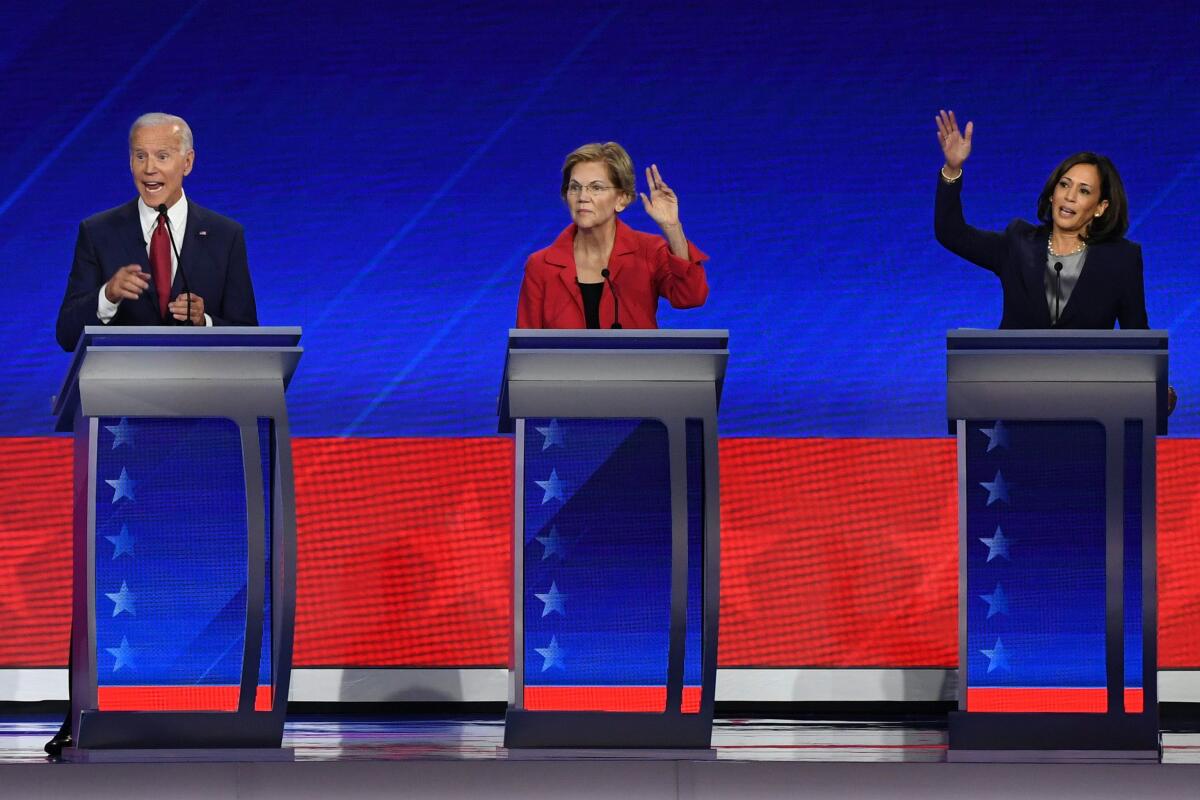The Democratic debate was a dizzying three-hour barrage of empty claims and grandiose promises

- Share via
I’m a policy wonk and a bit of a political junkie, but that’s mostly because politicians do policy. And political choices are policy choices, at the end of the day.
So I am clearly the target audience for a televised political debate like the one Thursday night among the 10 leading Democratic presidential contenders. But having watched the full 17 hours — OK, it was closer to 2½ — I have to say that the event was a near complete failure, unless the point was to leave me with less clarity about the candidates than I had before I tuned in.
It’s not that the candidates were all inarticulate or vague; most were actually pretty sharp. Nor were there too many people on stage. The problem was that they didn’t, you know, debate. They just pitched.
There was a hint at the beginning that this could be a really useful event. The candidates sunk deeply into the topic of healthcare, teasing out obvious and not-so-obvious differences among the various approaches to making insurance more available and affordable. Two clear alternatives emerged — switching to a single-payer system based on Medicare, and adding a free government-operated insurance plan to the Affordable Care Act — with a couple of variations on each, and key weaknesses and strengths of both laid out. The moderators, while not asking the sort of pointed questions that could have focused the debate, at least let the candidates speak at length and challenge one another’s assertions.
But then Julián Castro, who was critiquing former Vice President Joe Biden’s plan to build on the Affordable Care Act, took a schoolyard swipe at Biden’s mental acuity. And from that point on, there was little or no engagement between candidates. No more debating, no more weighing whose approach was better, no more probing for flaws. It was just a dizzying salad of promises and claims as the moderators wheeled the candidates from one topic to the next.
Oh, sure, simply letting the candidates vamp on topics was illuminating at times. Biden was a rambling stream-of-consciousness disaster on a couple of occasions, becoming less coherent the longer he spoke. Former Rep. Beto O’Rourke of Texas laid down the Democrats’ most aggressive marker yet on gun control. Sen. Kamala Harris of California delivered a few great punch lines, but seemed a lot more interested in talking about President Trump’s failures than the details of her own plans.
But to the extent the primary is a contest of ideas as opposed to personalities, the session wasn’t very illuminating. Whose approach to immigration is best? How about the economy and income inequality? Afghanistan? Trade policy? All of these topics got touched on, but only in the way you might run your hands over the sweaters on display at Macy’s. Chances are that viewers came away thinking that the best performers were the candidates they liked best at the start.
Illustrating how unfocused and unhelpful the evening was, different pundits offered a wide range of takes on who fared well and who did poorly Thursday night. My colleague on the news side Mark Z. Barabak, for example, thought Biden offered “one of his strongest and most assertive performances (graded on a curve).” Biden also got a thumbs-up from the Washington Post‘s Dan Balz. But Nate Silver at FiveThirtyEight opined, “As was the pattern in the previous debate, Biden started out fairly strong and got worse as the night went along, and the evening will probably most be remembered for his rambling answer to a moderator’s question about the legacy of slavery.”
If the Democratic National Committee were foolish enough to let me call the shots, I’d do a series of debates on a single issue, each filling an hour with a couple of commercial breaks. The point would be to show the public not just the competing plans for such major issues as immigration, education and foreign policy, but how well the candidates defend their views and absorb the good ideas of their rivals. And they would be actual debates, or battles of ideas.
But then, I like policy. And evidently, a whole lot of voters in the last presidential election did not share that affliction.
More to Read
A cure for the common opinion
Get thought-provoking perspectives with our weekly newsletter.
You may occasionally receive promotional content from the Los Angeles Times.










